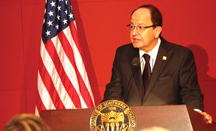USC President Nikias casts USC as trendsetting academic leader
By Amy E. Hamaker
 USC President C. L. Max Nikias describes USC’s strengths and challenges at his annual address to the Health Sciences Campus faculty on Feb. 11.
USC President C. L. Max Nikias describes USC’s strengths and challenges at his annual address to the Health Sciences Campus faculty on Feb. 11.
Photo/Tom DeSanto
The future of online education in higher learning, the global and local nature of university activities and the reintroduction of humanistic principles were topics touched on by USC President C. L. Max Nikias, PhD, in his address to Health Sciences Campus faculty on Feb. 11 at Aresty Auditorium.
Nikias discussed the changing face of higher learning, noting that online courses at USC are leading the way in terms of maintaining academic rigor and integrity. USC will not offer massively open university courses or online degrees for undergraduates, he said.
However, USC’s masters, executive and graduate programs will reach 7,600 students globall
y and bring in $123 million in revenue this year, a figure that is unprecedented for a top American research university.
Nikias expects that all USC schools will have some online offerings by next year, and hopes to double enrollment and degree offerings online over the next five years. … Read More »


